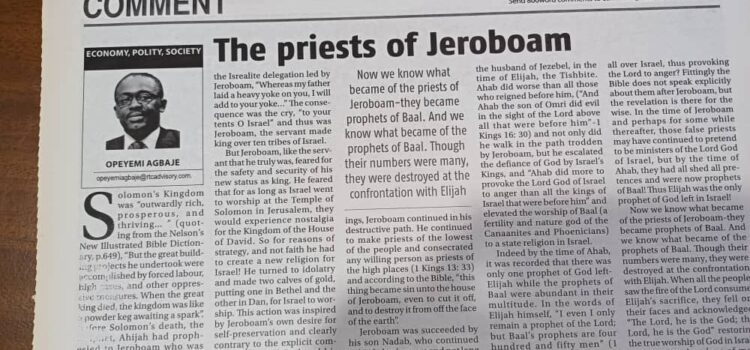Solomon’s Kingdom was “outwardly rich, prosperous, and thriving…” (quoting from the Nelson’s New Illustrated Bible Dictionary, p.649), “But the great building projects he undertook were accomplished by forced labour, high taxes, and other oppressive measures. When the great king died, the kingdom was like a powder keg awaiting a spark”. Before Solomon’s death, the prophet, Ahijah had prophesied to Jeroboam who was Solomon’s servant (1 Kings 11: 28) that God was going to tear the kingdom out of the hand of Solomon into twelve pieces and would give Jeroboam ten of those pieces. Unfortunately, Solomon’s successor, the unwise Rehoboam provided the final straw, listening to the advice of his inexperienced companions and declaring to the Israelite delegation led by Jeroboam, “Whereas my father laid a heavy yoke on you, I will add to your yoke…” The consequence was the cry, “to your tents O Israel” and thus was Jeroboam, the servant made king over ten tribes of Israel.
But Jeroboam, like the servant that he truly was, feared for the safety and security of his new status as king. He feared that for as long as Israel went to worship at the Temple of Solomon in Jerusalem, they would experience nostalgia for the Kingdom of the House of David. So, for reasons of strategy, and not faith he had to create a new religion for Israel! He turned to idolatry and made two calves of gold, putting one in Bethel and the other in Dan, for Israel to worship. This action was inspired by Jeroboam’s own desire for self-preservation and clearly contrary to the explicit commandments of God and his covenant with Israel. Jeroboam went beyond this initial error. He “made an house of high places, and made priests of the lowest of the people, which were not of the sons of Levi” (1 Kings 12: 31-33), again clearly for reasons of self and regime viability rather than service to God. In spite of several warnings, Jeroboam continued in his destructive path. He continued to make priests of the lowest of the people and consecrated any willing person as priests of the high places (1 Kings 13: 33) and according to the Bible, “this thing became sin unto the house of Jeroboam, even to cut it off, and to destroy it from off the face of the earth”.
Jeroboam was succeeded by his son Nadab, who continued in his father’s errors and not long thereafter, Baasha killed all the House of Jeroboam fulfilling the prophesy. Baasha was succeeded by his son Elah. Elah in turn was killed by his servant Zimri, but the people turned against Zimri and sided with Omri who prevailed against Zimri. Omri was succeeded by his son, Ahab, the husband of Jezebel, in the time of Elijah, the Tishbite. Ahab did worse than all those who reigned before him, (“And Ahab the son of Omri did evil in the sight of the Lord above all that were before him”-1 Kings 16: 30) and not only did he walk in the path trodden by Jeroboam, but he escalated the defiance of God by Israel’s Kings, and “Ahab did more to provoke the Lord God of Israel to anger than all the kings of Israel that were before him” and elevated the worship of Baal (a fertility and nature god of the Canaanites and Phoenicians) to a state religion in Israel.
Indeed, by the time of Ahab, it was recorded that there was only one prophet of God left-Elijah while the prophets of Baal were abundant in their multitude. In the words of Elijah himself, “I even I only remain a prophet of the Lord; but Baal’s prophets are four hundred and fifty men” (1 Kings 18: 22). I have previously wondered about an incongruity here. We know what became of Jeroboam-after his death, his son and successor, Nadab along with his entire genealogy was wiped out as decreed by the Lord. But what happened to the priests whom Jeroboam ordained carelessly and recklessly all over Israel, thus provoking the Lord to anger? Fittingly the Bible does not speak explicitly about them after Jeroboam, but the revelation is there for the wise. In the time of Jeroboam and perhaps for some while thereafter, those false priests may have continued to pretend to be ministers of the Lord God of Israel, but by the time of Ahab, they had all shed all pretences and were now prophets of Baal! Thus, Elijah was the only prophet of God left in Israel!
Now we know what became of the priests of Jeroboam-they became prophets of Baal. And we know what became of the prophets of Baal. Though their numbers were many, they were destroyed at the confrontation with Elijah. When all the people saw the fire of the Lord consume Elijah’s sacrifice, they fell on their faces and acknowledged “The Lord, he is the God; the Lord, he is the God” restoring the true worship of God in Israel and putting the plans of men to shame. And all the prophets of Baal were slain at the brook, Kishon.
Columnist’s Note-This article was first published on December 23, 2009 and republished on July 26, 2017
